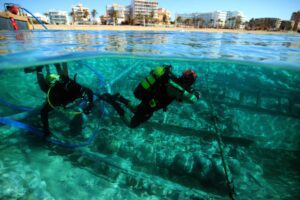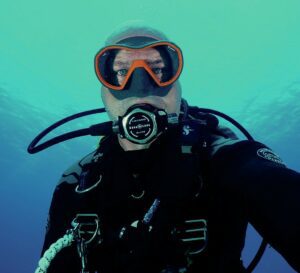These five PADI Specialty Courses – now all available on eLearning – each offer unique new skill sets that are sure to benefit any diver. If you’re looking to enhance your underwater explorations, and grow your diving knowledge, you’ll definitely want to consider one of these top courses.
With the option of eLearning, you can first complete the online portion of the course at your own pace through our easy-to-use interactive programme. Then, use our dive shop locator to connect with a PADI Dive Centre or Resort near you to complete your in-water training. With the added flexibility that eLearning offers, and the cool diving opportunities probably available in your local area right now, these specialty courses allow you to seek adventure in your own way.
Enriched Air Diver
As divers, we love slipping beneath the surface to experience the underwater world. So it’s no surprise that so many divers jump at the opportunity to stay underwater for longer – with enriched air.
Commonly called nitrox, enriched air is a form of breathing gas that has higher oxygen content and lower nitrogen content. During this course, you’ll learn about managing oxygen exposure, how to analyze oxygen content in a scuba tank, and how to set your dive computer to enriched air nitrox settings. With the skills learned from the PADI Enriched Air Diver Specialty Course, you’ll typically be able to dive longer, enjoy a shorter surface interval, and get back in the water sooner – an ocean-lovers dream.
Drysuit Diver
In a wetsuit, you get wet. In a drysuit, you stay dry. While they both do keep a diver warmer, a drysuit will ensure that you’ll stay toasty warm throughout your entire dive in cold water conditions. Since water draws heat away from the body about 20 times faster than air, a drysuit diver can stay warmer for longer.
During the online portion of this course, you’ll learn about different drysuit styles, best practices for maintaining a drysuit, dive safety procedures when using a drysuit, and the fundamentals of how to control buoyancy when drysuit diving. Then, you’ll do one confined water dive and two open water dives with a PADI Dive Centre or Resort to complete the full certification.
Search and Recovery Diver
Whether you need to locate and recover a piece of equipment that was dropped during a dive or fell overboard, or you’re working to remove large marine debris objects during a Dive Against Debris mission – the ability to skillfully search for and successfully recover things from the underwater world is an ideal skill set for most divers to add to their repertoire. Plus, you’re helping to keep the ocean clean!
During the online portion of this course, you’ll learn effective search patterns using a compass and natural navigation techniques, the dynamics of using a lift bag to bring heavy items to the surface, and how to plan a search and recovery operation based on what information is available. Then, you’ll do four dives with a PADI Dive Centre or Resort to complete the full certification.
Peak Performance Buoyancy Diver
Maintaining near-perfect buoyancy allows you to dive in style, optimize air consumption, and respect the surrounding marine environment – it’s a win-win-win! In addition, divers with excellent buoyancy control tend to have a much more relaxing experience underwater. With the ability to focus their attention on the unique underwater sights, there’s no need to be continuously assessing where they are in the water column.
During the online portion of this course, you’ll learn about techniques like gliding and hovering, how to ensure that you’ll be properly weighted on a dive, and how buoyancy control improves air use. Then, you’ll do two open water dives with a PADI Dive Centre or Resort to complete the full certification – putting what you learned into action.
Night Diver
Ready to dive into the darkness? Night diving is a thrilling way to explore the underwater world after the sun goes down. While night diving can be an unforgettable experience, it also requires a different set of skills and precautions to ensure safety.
During the online portion of this course, you’ll learn about specialized night diving equipment like underwater lights, how to communicate with your buddy in low visibility, and how to navigate using a compass and natural references.
Once you complete the online portion, you’ll do three open water dives with a PADI Dive Centre or Resort to gain practical experience navigating and exploring the underwater world at night.

This article was originally published in Scuba Diver ANZ #56
Subscribe digitally and read more great stories like this from anywhere in the world in a mobile-friendly format. Link to the article








